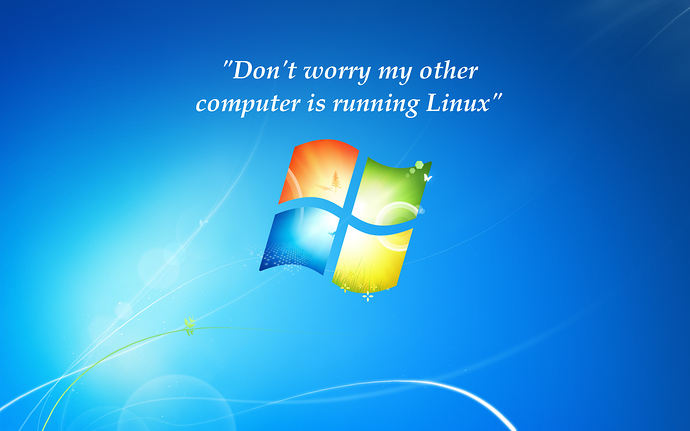alefattorini:
Viva Microsoft Edge
Ma anche no
Hi forum :)
Ma anche no has become a very popular idiom lately. It means No way, absolutely not and is used jokingly, in a very informal context.
e.g.
A) Are you going jogging with me Sunday morning at 7?
B) Ma anche no!
A former thread in...
3 Likes
robb
December 5, 2018, 9:36pm
4
I won’t mis it. Never used it anyways. (and I doubt I will ever use the MS version of Chrome)
stephdl
December 6, 2018, 6:39am
5
The only usage I made was to download firefox…so RIP
2 Likes
Jim
December 6, 2018, 11:17am
6
What’s up! Why don’t use curl ou wget?
robb
December 6, 2018, 11:49am
7
No edge on linux so I never needed to use Edge, not even to download firefox or chromium. (btw, a yum install firefox does the trick too)
1 Like
stephdl
December 6, 2018, 12:33pm
8
Yeah…I admit my ultim fault. I use from time to time a window. Either for my company or to test some features on development.
But I have a secret to support this pain
4 Likes
dnutan
December 12, 2018, 5:34pm
9
# Microsoft Edge and Chromium Open Source: Our Intent
Authors: Microsoft Edge Team
Last Updated: 2018-12-06
## Why this document
For the past few years, Microsoft has meaningfully increased participation in the open source software (OSS) community, becoming one of the world’s largest supporters of OSS projects. We are starting down a path to adopt Chromium open source in the development of Microsoft Edge on the desktop, becoming a larger contributor and user of its open source so that we can create better web compatibility for our customers and less-fragmentation of the web for all web developers.
**This document exists to clarify our thinking on how that work will proceed**: we want to explain our plans and intentions related to Microsoft Edge and the Chromium open-source project. The audiences we think will find this document most relevant and useful are (a) the people working on Chromium as approvers/maintainers and leading that project, (b) the companies and engineers who build other browsers and will be interested in the contributions we plan to make, and (c) the broader community of web developers, corporate-IT managers and partners we work with on Windows and Microsoft Edge. And of course, we and all those audiences care primarily about the end-user, who is ultimately the audience this work is intended to benefit.
### TL;DR
Working with open source is not new for Microsoft Edge. Our new mobile browser has been based on open source from its beginnings over a year ago. We’ve also used open source for various features of Microsoft Edge on the desktop (e.g. ANGLE, Web Audio, Brotli) and we’ve begun making contributions to the Chromium project to help move browsing forward on new ARM-based Windows devices. In that context, we have been thinking through plans to adopt the Chromium open source project in the development of Microsoft Edge on the desktop to create better web-compatibility for our customers and less-fragmentation of the web for all its developers, and we’re now ready to move forward.
As part of this, we hope and intend to become a significant contributor to Chromium, in a way that can make not just Microsoft Edge—but other browsers as well—better on both PCs and other devices. We’ve written down our “OSS Principles for Microsoft Edge” below and “What Happens Next” to clearly outline our approach to contributions.
Our plan is to engage in a way that embraces the well-established open source model that’s been working effectively for years: meaningful and positive contributions which align with long-standing thoughtfully-designed architecture, collaborative engineering, and keeping in mind that we, together as a community, seek the best outcome for all people who use the web across many devices.
## Microsoft and The Web Today
Our *intent* is profoundly informed by our context. Historically, Microsoft has focused on three primary constituencies: end-users, developers, and enterprises/organizations. These audiences have informed the investments we have made in Internet Explorer in the past, and now inform the investments we make in Microsoft Edge. As we have listened to these customers over the last few years, a consistent theme they echo is the increased complexity of their environments, and a desire for consistency, simplicity, reliability, compatibility.
We have effectively partnered with Google and other browser vendors over the years, first in the W3C and now even more closely through the WHATWG, to create common standards for the web platform to reduce this complexity and to improve the overall web experience. While browser vendors across the industry have made significant progress in aligning to these common standards, the underlying implementations and differing release schedules have created difficulties for our developers to fully benefit from the promises of the open web.
show original
https://blog.mozilla.org/blog/2018/12/06/goodbye-edge/
1 Like
mark_nl
December 12, 2018, 5:46pm
10
Thank you for this; a other view is Google gets more (all?) grip on our internet…
EDIT: api breakage .
robb
December 12, 2018, 8:54pm
11
Although I have used firefox a LOT and for a very long time, I recently switched to (de-googled) chromium. IMO it is more privacy friendly.
LayLow
December 12, 2018, 9:09pm
12
What is the story on Brave?
saitobenkei
December 13, 2018, 9:27am
13

![]() (If someone knows how to translate the sentence in English…)
(If someone knows how to translate the sentence in English…)![]()





